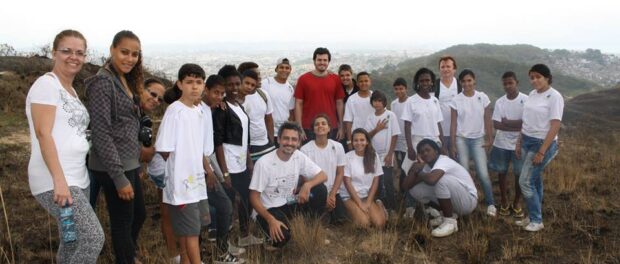
Between the smoke and the bullets of Rio’s North Zone / The Serra takes on its biggest challenge yet, becoming green / I love you, Serra da Misericórdia
– Luiz Poeta, founder of Verdejar
Complexo do Alemão is home to the city’s North Zone‘s last remaining piece of Atlantic Forest, which stretches across Brazil’s Atlantic coast. The Serra da Misericórdia, a 17 square-mile piece of land, spreads through the 15 neighborhoods that make up Complexo do Alemão, home to approximately 200,000 people.
A group of 17 young people from Complexo do Alemão have joined the fight to preserve the Serra by producing a documentary entitled Olhares da Misericórdia (Views of Misericórdia). The short film mixes interviews with people who have a connection to the area, mostly long-term residents, with music, poetry and photos.
Patricia Lima, part of the group, described the Serra as “like our lung. If we lost this land, we’d suffocate in the polluted air of the city that is Rio de Janeiro,” she joked.
The documentary and accompanying photo booklet was created by the NGO Verdejar (“Becoming Green”), founded 17 years ago by the late poet, activist and Complexo do Alemão resident Luiz Poeta.
Verdejar campaigns for the protection of the Serra, which has seen consistent degradation caused by people and companies encroaching on the land, notably granite mining companies and the government energy company Light, which was responsible for the removal of the NGO from its previous headquarters in 2012.
Verdejar’s activities include reforestation, community gardening and environmental education. Rafael Carvalho, one of Verdejar’s collaborators, says that the documentary project was a chance to “make a link between culture and the environment.”
The documentary is the result of Verdejar being awarded the status of Culture Point by the federal government in 2013. Culture Points are a Brazil-wide federal government initiative launched in 2004 to recognize and support community-led groups that promote access to culture. The Brazilian government has committed to a target of 15,000 Culture Points by 2020, each receiving an annual grant of about US$20,000 (R$60,000). There are currently about 4,000 such Culture Points throughout Brazil.
Rafael explains that the group of young people “received training on the environmental history of the region and in audio-visual skills: how to film, how to edit… And from then on the idea was all theirs.”
The documentary was screened for the first time in three Complexo do Alemão communities over a weekend in March. Verdejar’s aim was to share the documentary with local residents in small public screenings before making it available online.
Many of the young people involved in the project attended the first screening in Olaria. Alvaro Vinícius, one of the filmmakers, described the group’s intention: “We’re calling attention to the positive side of the Serra. We all know the problems, those who live here have lived alongside these problems for years.” With the documentary, “we’re looking for solutions for this place. We don’t want the Serra to continue towards the predicament it’s headed towards.”
The Olaria screening was followed by a debate on ‘critical communication’ in favelas, to which representatives from community media groups had been invited, including Raizes em Movimento, Copa Para Alemão Ver and Coletivo Papo Reto. Discussion was focused on the idea of communication as a powerful tool for residents to demystify the image of Complexo do Alemão, propagated by traditional media.
Patricia spoke up during the debate to stress the importance of communities making their voices heard, from sharing information on social media to creating original content: “Residents can become communicators.” She described her experience as part of the documentary team: “I began with the photography course, then I got to know more about the history of the Serra, about the struggles that happened there…I never imagined I’d make a documentary about something so important.”
Those involved in the project hope the documentary will become a resource in Complexo do Alemão and beyond. In Alvaro’s words: “I know the quality of this place; I have spent my whole life here. Now we’re excited about spreading our passion to others… I want people in the future to know that it exists: the place where I grew up.”
Check out part of the documentary’s soundtrack below:
[soundcloud url=”https://api.soundcloud.com/tracks/155275492″ params=”color=ff5500&auto_play=false&hide_related=false&show_comments=true&show_user=true&show_reposts=false” width=”100%” height=”166″ iframe=”true” /]



